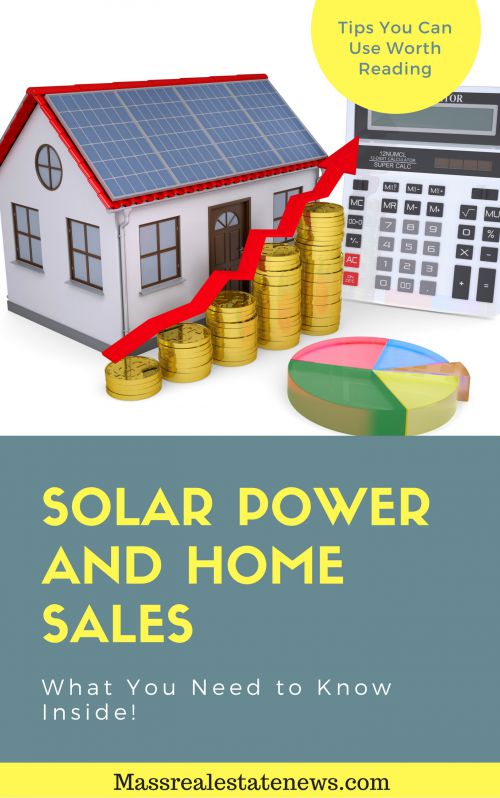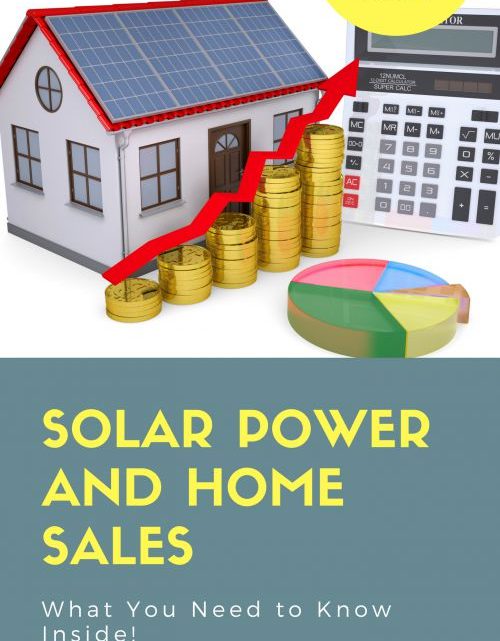Solar Panels and Home Sales
 Back in 2006, only about 30,000 homes in the U.S. had solar panels. But today, over 1.3 million American homes have gone solar.
Back in 2006, only about 30,000 homes in the U.S. had solar panels. But today, over 1.3 million American homes have gone solar.
As solar panels become increasingly common across the U.S., so too have sales of homes that include solar energy systems. But selling a home with solar panels can be tricky, and many homeowners and real estate agents are unfamiliar with the best way to represent their home solar system.
Most people know that solar panels are a great way to both reduce their carbon footprint and save money on energy costs. But fewer people know that solar panels can also add value to their home. According to a 2015 study by Berkeley National Laboratory, prospective home buyers are willing to pay an average of about $4 per watt of installed solar panels. For a solar energy system of standard size, this adds about $15,000 to the home’s value.
It is important to note, however, that adding solar panels to your home do not always increase the value by the amount the system costs. In some circumstance solar panels can in fact make your home harder to sell.
For example, putting solar panels on the front of a beautiful luxury home is probably not going to help the curb appeal. Some systems can in fact be fairly unattractive. Also if you have a leased system don’t expect any return in the sale price of your home.
Home sellers need to do some research before hand if they are concerned about their return on investment. This is especially true if there could be a relocation in the near future. There isn’t much point in sinking 30,000-40,000 in your home only to find out you may only recapture half of your money.
While the ultimate result of installing solar power is saving money, you won’t reap those benefits if you sell your home shortly after installation. Whether solar panels are worth the cost should be based upon whether you plan on being in the home for a while.
Appraisals With Solar Panels Might Be Problematic
Unfortunately, home appraisers sometimes fail to include the value of your solar panels when calculating the price of your home, which can lead to complications in the selling process. If you include the value of your solar panels in the sale price of your home but a potential buyer’s home appraiser does not, the buyer will likely place a lower purchase offer than they otherwise would if their appraiser was better informed.
If you’re selling your home through a Realtor, try to work with one who has experience selling properties that have solar panels installed. A Realtor who has previously sold solar-powered homes will be able to work with appraisers and prospective buyers to help them better understand the benefits and capabilities of your home’s solar energy system. You or your real estate agent should be able to educate buyers and answer any questions they might have.
Provide your Realtor with all the details about your solar system, including its installation date; the make, model, and wattage of the panels; the type of inverter you have; and other relevant information. Be sure to emphasize any special qualities the system might have, including above-average efficiency rates or extended warranties.
Use the details about your system to attract home buyers. If your system was connected by a professional solar installer, you or your real estate agent might promote the installer’s reputation and the strength of their brand to make your home more attractive.
For instance, when listing details about your home’s solar system online, you might advertise that it was installed by Company X, which has installed over 200,000 solar systems in eight states.
Don’t forget to include details about your savings to date and your expected savings over time. Compare the per-watt price you’re paying for electricity against the average price in your area. If your solar system produces most or all the electricity you need, emphasize the fact that you’re paying nothing (or nearly nothing) for electricity over the lifetime of the solar panels, which are typically warrantied for 25 years.
Electricity costs for the general public, on the other hand, increase by about three to five percent annually. Be prepared to share some copies of your recent energy bills with potential buyers to illustrate the savings they could reap.
Keep in mind if there have not been that many similar sales in your area with solar panels installed, the appraiser will have a difficult time showing an increase in home value.
Share Financial Incentives For Having Solar
You should also offer information about financial incentives that the buyer might be able to qualify for. While some incentives (like the solar investment tax credit) are only available to homeowners who personally purchase and install solar energy systems, other incentives are available to anyone who lives in a home powered by solar energy.
Referring to these financial incentives when adding your property to home buyer’s guides will excite prospective buyers and enable them to make a more informed choice. Be sure to inform real estate agents and listing companies of all the financial incentives that a homeowner would qualify for and how much they would receive, on average, from each. And, depending on which incentives you’ve been receiving, you might have to talk to city or county government offices in order to ensure they stop crediting you after you actually sell your home.
Some home buyers might have concerns about solar panel maintenance. Assure them that because solar panels have no moving parts, maintenance is virtually nonexistent. And if your panels are still covered by a service agreement, let the potential buyers know that any problems will be covered until the agreement expires. You should also be clear about the status of warranties for other parts and equipment like an inverter, batteries, and so on.
If you’ve leased your solar panels, selling your home can be trickier. In order to assume the lease, potential buyers will need to meet all the same credit requirements that you did when you signed it. You, the buyer, and the company leasing the solar panels will then need to sign a transfer agreement (typically drafted by the leasing company) that allows the buyer to assume the lease payments.
If you can’t find a qualified buyer, you could be forced to buy out the remainder of the lease. Depending on how much time is left on your lease contract, you could face a fee of $15,000 to $20,000 or more. (The possibility of getting stuck with a large buyout fee is yet another reason why it’s better to buy your solar panels rather than to lease them.)
However, whether you transfer the lease or buy it out, you might be slapped with a fee just for abandoning the initial conditions of the contract.
You might encounter similar problems if you financed your home through a PACE or HERO loan. These government-backed loan programs help homeowners buy or lease solar and other renewable energy systems. PACE and HERO loans are tied to tax assessments on the property, so in most cases the loan should transfer to the home buyer. However, like any other loan agreement, each one is somewhat unique, and the terms of the loan should be examined carefully to determine what your obligations are.
If you’re leasing your solar panels, talk to the company from which you leased them as soon as you begin considering a move. If you financed your panels through a HERO or PACE loan, talk to the financial institution that approved the loan. That way, you’ll know exactly what your options are and you’ll be able to develop a sale plan that suits your situation.
The bottom line when selling a home with solar panels is to do your research and be honest about the many benefits of your solar energy system.
Additional Helpful Articles
- Best Home Improvement articles via Kyle Hiscock.
- What to look for in a green home via Ryan Fitzgerald.
- Best home remodeling projects via Maria Mastronolardo.
Use these helpful resources to make smart decisions around your home!
About the author: The guide to selling a house with solar panels was written by Kyle Pennell is the Content Manager at PowerScout — they help homeowners figure out if installing solar is right for them and get competitive bids from multiple installers. Their long-term mission is to accelerate the adoption of solar (and other smart home improvements), which will help mitigate climate change.













No Comment